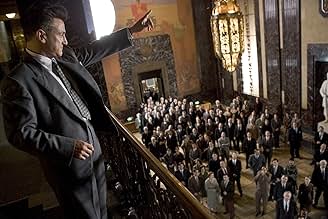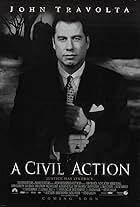Based on the Robert Penn Warren novel. The life of populist Southerner Willie Stark, a political creature loosely based on Governor Huey Long of Louisiana.Based on the Robert Penn Warren novel. The life of populist Southerner Willie Stark, a political creature loosely based on Governor Huey Long of Louisiana.Based on the Robert Penn Warren novel. The life of populist Southerner Willie Stark, a political creature loosely based on Governor Huey Long of Louisiana.
- Awards
- 2 wins & 4 nominations
Travis Champagne
- Tom Stark
- (as Travis M. Champagne)
Frederic Forrest
- Willie's Father
- (as Frederic F. Forrest)
- Director
- Writers
- All cast & crew
- Production, box office & more at IMDbPro
Storyline
Did you know
- TriviaThe movie was a major flop and, despite its strong cast and production team, grossed only $9.4 million worldwide on a budget of $55 million. Forbes Magazine voted it the biggest flop in the years spanning 2005-2009. Few critics endorsed it, despite its having garnered strong Oscar buzz before its premiere. Director Steven Zaillian described the experience as "like getting hit by a truck".
- GoofsAnne has finished braiding her hair while sitting in the kitchen in the flashback scene. When she goes upstairs, her hair is no longer braided.
- Quotes
Jack Burden: [to Anne, explaining what happened to his marriage] A lot of tangled bedclothes and unspoken loathing, then spoken loathing and no tangled bedclothes.
- SoundtracksSmokestack Lightnin'
Written by Howlin' Wolf
Performed by Howlin' Wolf
Courtesy of Geffen Records
Under license from Universal Music Enterprises
Featured review
A door-to-door salesman, Willie Stark (Sean Penn), is a straightforward man with decent morals and a commitment to the common weal. Such a winning profile is quickly spotted by political hucksters who disingenuously persuade him to stand for Louisiana State Governor simply to split the opposition vote. Stark gets wise to this attempt to use him as a pawn and, in a dramatic turnabout, throws away a prepared speech and appeals to the people, declaring himself a 'hick among the hicks' who will stand up for the commoners' needs. Once made Governor, he does indeed set about popular reform programs, also hiring reporter Jack Burden (Jude Law) to dig dirt on anyone who stands in his way. Jack, unfortunately, comes from the wrong (well-heeled) side of town and soon finds his loyalties torn when Judge Irwin (Anthony Hopkins) refuses to publicly support Stark. Jack also has some unpleasant surprises in store as he is reunited with childhood friends Adam Stanton, a determinedly unmaterialistic character who doesn't want to be in anyone's pocket, and his luscious sister Anne (Kate Winslet), both of whom are tangling in different ways with Willie Stark before very long. This is a towering story set in the deep south, amid sweltering ideals and where goodness only comes out of the dirt - which means that everyone has some dirt on them somewhere.
All the King's Men aims at being quality, heavyweight cinema with outstanding performances. Penn sets a standard, delivering one of his most moving demonstrations of carefully chiselled acting skills.
Having given All the King's Men such accolades, you might think I'd be struggling to find fault with it but, although many of the elements might individually be worthy of an Oscar, my overall impression was that the film showcases a lot of remarkable talent rather than putting it to its finest use.
This is the second time Robert Penn Warren's book has been made into a major movie, yet we might wonder if much of the subtle analysis that space allows an author is being woefully denied filmmakers because of time restraints. Although the movie is to be congratulated for not using a trowel to lay on contemporary analogies about political power, corruption and oil, some character development in other morally ambiguous areas would not have gone amiss. Did power finally corrupt Willie Stark, and how far did he go in using criminals to further his beneficial public works? Penn creates a powerful figure, but the story, for all its tension, remains sadly predictable. The title is never clearly explained in the film, although it can elsewhere be attributed to a motto used by real life Governor Huey Long (on whom the story is arguably based): "Every Man a King" - which was part of a Share Our Wealth program of heavy taxation for wealthy individuals and corporations. In 1929, Long had called a special session of the legislature so as to enact a five-cent per barrel 'occupational license tax' on production of refined oil, in order to help fund social programs. What would originally have been complex trade-offs between a rich elite and an impoverished, post- Great Depression lower class, is in the movie reduced to high-sounding truisms about ideals and finding things of value. The rhetoric, forcefully delivered (as it is here) is an actor's dream, but although the story is beautifully and dramatically told, it lacks enough surprises, is heavy with the gravitas of its own self-importance, and may tempt some audiences simply to exclaim, 'So what'? Reading up on the background can supply a context that gives All the King's Men greater depth, but as entertainment it is a tour-de-force that is at the same time unsatisfying.
All the King's Men aims at being quality, heavyweight cinema with outstanding performances. Penn sets a standard, delivering one of his most moving demonstrations of carefully chiselled acting skills.
Having given All the King's Men such accolades, you might think I'd be struggling to find fault with it but, although many of the elements might individually be worthy of an Oscar, my overall impression was that the film showcases a lot of remarkable talent rather than putting it to its finest use.
This is the second time Robert Penn Warren's book has been made into a major movie, yet we might wonder if much of the subtle analysis that space allows an author is being woefully denied filmmakers because of time restraints. Although the movie is to be congratulated for not using a trowel to lay on contemporary analogies about political power, corruption and oil, some character development in other morally ambiguous areas would not have gone amiss. Did power finally corrupt Willie Stark, and how far did he go in using criminals to further his beneficial public works? Penn creates a powerful figure, but the story, for all its tension, remains sadly predictable. The title is never clearly explained in the film, although it can elsewhere be attributed to a motto used by real life Governor Huey Long (on whom the story is arguably based): "Every Man a King" - which was part of a Share Our Wealth program of heavy taxation for wealthy individuals and corporations. In 1929, Long had called a special session of the legislature so as to enact a five-cent per barrel 'occupational license tax' on production of refined oil, in order to help fund social programs. What would originally have been complex trade-offs between a rich elite and an impoverished, post- Great Depression lower class, is in the movie reduced to high-sounding truisms about ideals and finding things of value. The rhetoric, forcefully delivered (as it is here) is an actor's dream, but although the story is beautifully and dramatically told, it lacks enough surprises, is heavy with the gravitas of its own self-importance, and may tempt some audiences simply to exclaim, 'So what'? Reading up on the background can supply a context that gives All the King's Men greater depth, but as entertainment it is a tour-de-force that is at the same time unsatisfying.
- Chris_Docker
- Oct 23, 2006
- Permalink
- How long is All the King's Men?Powered by Alexa
Details
- Release date
- Countries of origin
- Official site
- Language
- Also known as
- Nhà Lãnh Tụ
- Filming locations
- Production companies
- See more company credits at IMDbPro
Box office
- Budget
- $55,000,000 (estimated)
- Gross US & Canada
- $7,221,458
- Opening weekend US & Canada
- $3,672,366
- Sep 24, 2006
- Gross worldwide
- $9,451,623
- Runtime2 hours 8 minutes
- Color
- Sound mix
- Aspect ratio
- 1.85 : 1
Contribute to this page
Suggest an edit or add missing content












































